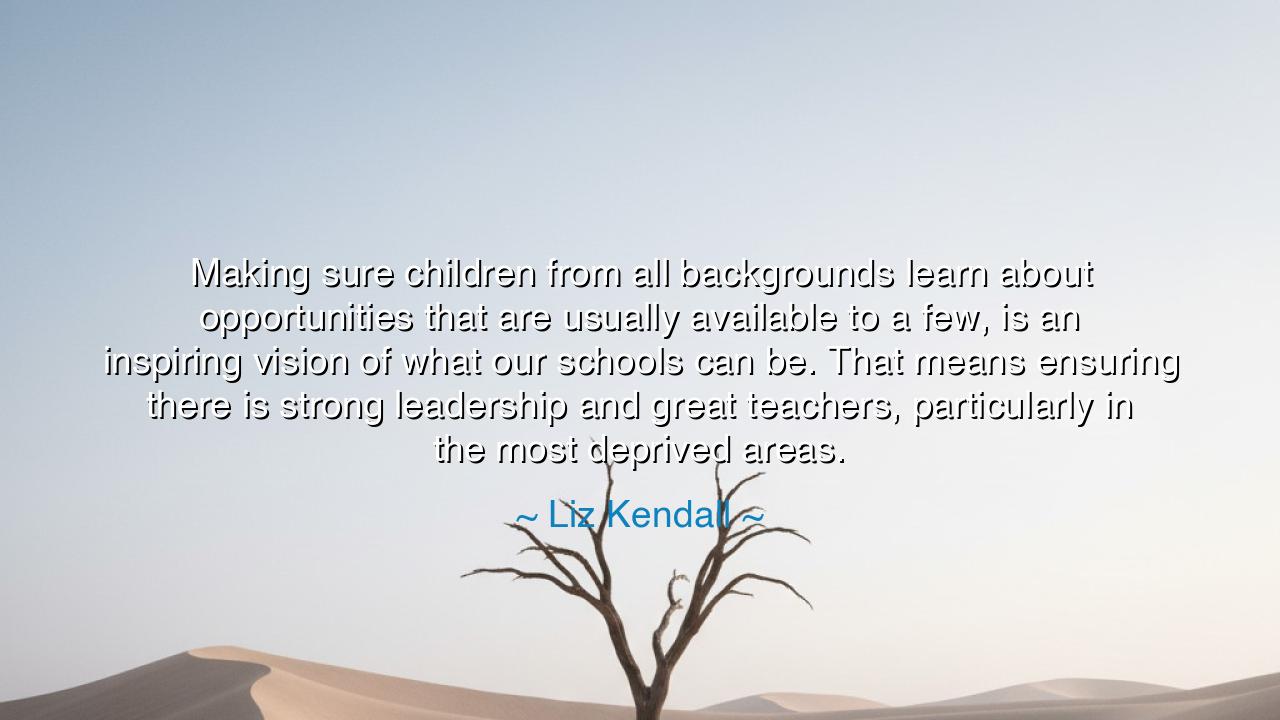
Making sure children from all backgrounds learn about
Making sure children from all backgrounds learn about opportunities that are usually available to a few, is an inspiring vision of what our schools can be. That means ensuring there is strong leadership and great teachers, particularly in the most deprived areas.






Hear the words of Liz Kendall, who spoke with vision for the young and the powerless: “Making sure children from all backgrounds learn about opportunities that are usually available to a few, is an inspiring vision of what our schools can be. That means ensuring there is strong leadership and great teachers, particularly in the most deprived areas.” In these words is a call both noble and urgent: that the light of opportunity must not be confined to the halls of the wealthy, but must be carried to every corner where children dwell, even in the shadow of poverty.
For education is not merely the transfer of knowledge, but the unlocking of doors—doors that lead to professions, to discoveries, to lives that might otherwise remain caged. If opportunity is given only to a few, then injustice hardens into destiny, and the dreams of countless children are buried before they ever awaken. Kendall declares that schools must be more than places of instruction; they must be gateways to a world of possibility, where every child, regardless of birth, is told: you too may rise.
History gives us many witnesses to this truth. Consider Abraham Lincoln, born in a log cabin, raised in hardship. His family had no wealth, no influence, no “zip code” of privilege, but the few books he managed to study lit within him a fire that carried him to the presidency. Had opportunity been denied to him because of his background, America would have been deprived of one of its greatest leaders. His life proves that greatness often sleeps in the most modest homes, waiting only for the spark of education.
So too, think of Mary McLeod Bethune, the daughter of former slaves, who founded a school for African American girls in an era when prejudice and poverty sought to crush them. She believed that education was the ladder out of darkness, and she built that ladder herself with strength, faith, and sacrifice. Through her efforts, thousands of children who were told by society that they could never rise, found not only knowledge but hope. She was the embodiment of Kendall’s words: strong leadership, great teaching, and vision in the most deprived of places.
The meaning of Kendall’s quote is also a call to leaders and teachers. For it is not enough to build schools of stone; we must build schools of spirit. Strong leadership ensures that schools do not crumble under neglect or injustice. Great teachers ensure that the classroom becomes a place not only of learning, but of inspiration. Where these are lacking, children may attend school yet never taste true opportunity. But where they are present—even in the poorest neighborhoods—miracles of transformation can and do occur.
The lesson for us, O seekers of wisdom, is this: do not measure a school by the wealth of its surroundings, but by the courage and dedication of its leaders and teachers. Do not believe that opportunity is the birthright of the privileged alone. Instead, fight to ensure that every child sees a path before them, that every student hears the words, “You are capable. You are worthy. You are destined for more.” This is the sacred duty of education.
Practical actions must follow. Support schools in deprived areas with resources and respect. Encourage and honor teachers who take on the hardest assignments, for they are the guardians of the nation’s future. If you are a parent, foster curiosity and hope in your children. If you are a leader, ensure that policies lift the most neglected. And if you are a citizen, remember that the success of all children strengthens the whole society, while the neglect of any child weakens us all.
Thus let Kendall’s words be remembered: schools must be the keepers of opportunity, not the gatekeepers of privilege. Let leadership be strong, let teachers be great, and let no child be denied the vision of what they might become. For in the poorest classroom may sit the next healer, the next builder, the next leader of nations—and our duty is to ensure that their flame is never extinguished, but nurtured until it lights the world.






AAdministratorAdministrator
Welcome, honored guests. Please leave a comment, we will respond soon